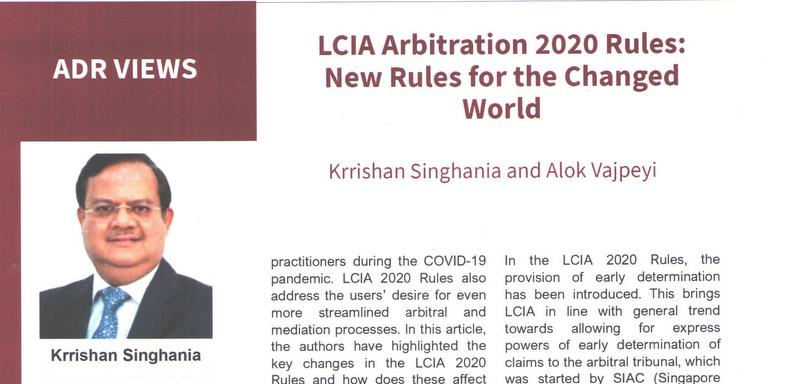On August 11, 2020, the London Court of International Arbitration (“LCIA”)revised its arbitration rules (“LCIA 2020 Rules”). These Rules will come into force on 1 October 2020. The Rules supersede the 2014 edition of the LCIA Arbitration Rules (“LCIA 2014 Rules”).
The changes introduced by the LCIA reflect the recent developments in good practice amongst arbitration and mediation practitioners during the COVID-19 pandemic. LCIA 2020 Rules also address the users’ desire for even more streamlined arbitral and mediation processes. In this article, the authors have highlighted the key changes in the LCIA 2020 Rules and how does these affect the LCIA Arbitrations.
Commencement of Arbitration
LCIA 2020 Rules allow a party to use a single, composite request for arbitration to commence more than one LCIA arbitration, whether against one or more respondents or under one or more arbitration agreements.
Under Article 1.2 of the LCIA 2020 Rules, a claimant wishing to commence more than one arbitration under the LCIA Rules (whether against one or more respondents and under one or more arbitration agreements) may serve a composite request for arbitration in respect of all such arbitrations. This change means that claimants will no longer need to file multiple requests.
Early Determination
Under LCIA 2014 Rules, it was accepted that arbitral tribunals had an implied power of early dismissal in relation to claims outside their jurisdiction or claims which are manifestly unmeritorious.
In the LCIA 2020 Rules, the provision of early determination has been introduced. This brings LCIA in line with general trend towards allowing for express powers of early determination of claims to the arbitral tribunal, which was started by SIAC (Singapore International Arbitration Centre) in 2016 and then followed by the institutions like SCC (Stockholm Chamber of Commerce) in 2017 and HKIAC (Hong Kong International Arbitration Centre) in 2018.
Consolidation & Concurrent conduct of Arbitrations
The new Article 22A of the LCIA 2020 Rules broadens the power of the LCIA Court and the tribunal to order for consolidation and concurrent conduct of the arbitration proceedings. Even in cases where parties have not agreed in writing for such consolidation, the LCIA Court or the arbitral tribunal can order for consolidation if (a) the arbitration has been commenced under the same arbitration agreement or any compatible arbitration agreement/s, and (b) either the arbitration agreement exists between the same disputing parties or the disputes have arisen out of the same transaction or series of related transactions.
Use of Technology
The LCIA 2020 Rules makes it clear that all requests for arbitration and responses must be submitted in electronic form, and parties will require prior permission to file documents in any other form.
The LCIA 2020 Rules address virtual hearings in greater detail. The LCIA 2014 Rules provided for the possibility of hearings being held by video, the LCIA 2020 Rules in Article 19.2 state that “a hearing may take place in person, or virtually by conference call, videoconference or using other communications technology with participants in one or more geographical places (or in a combined form).”
The changes in virtual hearing rules also includes clarification that, if a hearing takes place otherwise than in person, it will nonetheless be treated as being conducted at the arbitral seat (this mirror and supplements the existing provisions for in person hearings held at locations other than the seat). Moreover, Article 26.2 of the LCIA 2020 Rules provides for electronic signature of the award.
Data Protection
In the age of virtual hearings and electronic filings, data protection becomes significant. Under Article 30.4 of the LCIA 2020 Rules, it is stated that any processing of personal data by the LCIA is subject to applicable data protection legislation. Further, after due consultation with the parties or the LCIA, a tribunal can also adopt (a) any specific information security measures to protect the physical and electronic information shared in the arbitration; and (b) any means to address the processing of personal data produced or exchanged in the arbitration in light of applicable data protection or equivalent legislation.
Role of Tribunal Secretary
The international arbitration community has seen a rise in the appointment of tribunal secretaries. With the incorporation of Article 14A into the LCIA 2020 Rules, the process of approval and appointment of a tribunal secretary, its role and involvement in the arbitration proceedings have been envisaged as a binding provision. The LCIA 2020 Rules also mandate a disclosure from the tribunal secretaries as to their independence and ability to devote time in the case.
Nationality of Parties
To deal with the issue of determination of nationality, Article 6 of the LCIA 2014 Rules is revised to require parties to give information on their nationality, and to clarify how nationality is to be determined. This will aid in the timely appointment of sole and presiding arbitrators (who must be of different nationality to the parties).
The LCIA 2020 Rules have set out a detailed framework for determination of nationality. The LCIA 2020 Rules explain the process of determination of nationality both in case of a natural person and in case of a legal person. As far as a natural person is concerned, nationality under the LCIA Rules means citizenship, acquired by birth or naturalization or other relevant requirements. For a legal person, nationality has been defined as the jurisdiction in which it is incorporated and has its seat of effective management. A legal person that is incorporated and has its seat of effective management in different jurisdictions shall be treated as a national of both jurisdictions.
Improving Efficiency
The LCIA 2020 Rules introduce a number of changes designed to improve the efficiency of the arbitration proceedings:
- Under Article 15.10 of the LCIA 2020 Rules, the arbitral tribunals are given a three-month deadline from the last submission by the parties to issue the final award.
- Under Article 14.3 of the LCIA 2020 Rules, the tribunal and the parties are now required to make contact within 21 days of the tribunal’s appointment.
- Under Article 14.6 of the LCIA 2020, a list of certain steps that a tribunal can take to expedite the procedure (such as limiting written submissions, limiting the written and oral testimony of witnesses or employing technology) are contemplated.
Costs of Emergency Arbitrator
The LCIA 2020 Rules allow an emergency arbitrator to determine the costs of the emergency proceedings. They also expressly allow arbitrators to take the conduct of the parties’ representatives into account when making costs awards.
LCIA Administrative Fees
The LCIA’s Schedule of Costs has also been revised with the increase in the maximum hourly rate to be charged by arbitrators to £500 from the £450. This will lead to increase in cost of the LCIA Arbitrations.
Conclusion
The LCIA 2020 Rules are praiseworthy as it takes into consideration the issues faced by the parties to the arbitration in the present pandemic, and also upgrades the rules in line with the practices of other arbitral institutions. LCIA 2020 Rules have also laid down the guidance on compliance and data protection, which are unique and have not been contemplated in the rules of other arbitral institutions.
The updated rules of the LCIA strikes a balance between meeting the needs of modern users by introducing various technology related changes and maintaining the stability and predictability of the LCIA Rules by not making lot of changes.
The amendments also reflect practices first pioneered by other arbitral institutions that have proven effective (such as early determination and broader consolidation powers). Overall, the changes introduced by the LCIA are a welcome development as they are likely to further facilitate efficient and streamlined arbitration proceedings.






